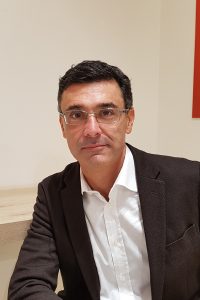Andrea Detti (Ph.D.) is a Professor in the Department of Electronic Engineering at the University of Rome “Tor Vergata”. He teaches Mobile Wireless Networks and Cloud Computing, and serves as the coordinator of the Bachelor’s Degree in Internet Engineering and the Master’s Degree in ICT and Internet Engineering.
His research interests lie in the field of computer networks, with a focus on framework design, analytical modeling, performance evaluation through simulation and testbeds. He has co-authored over 90 scientific papers published in journals and conference proceedings, addressing topics such as information-centric networking, software-defined networking, overlay architectures, wireless and optical networks. His current research is primarily focused on Cloud Computing.
Prof. Detti is an Associate Editor of the IEEE Transactions on Network and Service Management, and has served as Guest Editor for two special issues on Information-Centric Networking in Elsevier Computer Networks and the Journal of Internet Technology. He has been a reviewer for numerous ACM, IEEE, and Elsevier journals and conferences.
He has participated in and coordinated several European and international research projects, including:
-
EU Horizon Europe FLUIDOS (2023–2025) – Cloud Continuum (Open Call participation),
-
EU H2020 Fed4IoT (2018–2021) – Virtual IoT environments for smart city applications (Coordinator),
-
EU H2020 BONVOYAGE (2015–2017) – Federated multimodal Intelligent Transport Systems (Coordinator since 2017),
-
EU-JP ICN2020 (2017–2019) – ICN services for cloud applications (Work Package Leader),
-
EU-JP FP7 GreenICN (2013–2015) – Energy-efficient ICN (Work Package Leader),
-
EU FP7 CONFINE (2013–2014) – Coordinator of two funded proposals on ICN and SDN,
-
EU FP7 OFELIA (2012–2013) – ICN over SDN integration,
-
EU FP7 CONVERGENCE (2010–2013) – Pub-sub ICN architectures,
-
EU FP7 FLAVIA (2010–2013) – Virtualizable wireless future Internet,
-
EU FP6 E2R (2004–2005) – End-to-End Reconfigurability,
-
EU FP7 SMS (2006–2008) – Simple Mobile Services.
Since 2006, he has also been the scientific coordinator of several industrial research projects (in collaboration with Telecom Italia and SSI/Finmeccanica), addressing data-centric publish-subscribe paradigms over Mobile Ad-hoc Networks (MANETs), Delay Tolerant Networks (DTNs), and cellular networks.
Teaching
Internet Technologies and Protocols (II) (9 CFU, up to 2016):
The course deals with novel networking paradigms with a special focus on distributed solutions to control the transferring of data in the network. Specifically, we consider: the deployment of network connection with guaranteed quality of service (IP QoS); Internet intradomain (OSPF) and interdomain (BGP) routing; MPLS traffic engineering; the deployment of virtual private networks for spatially distributed companies (Virtual Private Networks); massive distribution of multimedia contents (Content Delivery Network)
distributed infrastructure for user to user data dissemination (Peer to Peer).
The teaching faces algorithms, protocols, technologies, and performances. Furthermore, more than fifty percent of the course is for laboratory experience with Linux and Cisco Routers, during which students “make real” on their laptop the theoretical lectures.
Mobile Wireless Networks (9 CFU):
Mobile Wireless Networks is a course that provides theoretical and technological concepts underlying modern wireless communications. The course focuses on the most recent Cellular Networks, in particular 4G systems and their relative 5G evolution. Some theoretical aspects are supported by planning exercises based on MATLAB. The course program includes physical layer aspects (modulation, channel encoding, channel models, and fading); use of multiple antennas (diversity, spatial multiplexing, beamforming, massive MIMO); multiple access schemes (TDMA, FDMA, CDMA, OFDMA); radio network planning in terms of coverage and capacity planning; historical overview of GSM/EDGE/UMTS architectures; focus on LTE architecture and RAN and EPC protocols; 5G New Radio and 5G Core.
Cloud Computing and Networking (6 CFU):
The cloud computing and networking course explores the technologies behind the scene of modern cloud services. Fundamentals of cloud computing are considered, including server virtualizations, hypervisors , container engines and runtimes, distributed storage, data center networking, virtual networking, Software Defined Network, and OpenFlow, etc. Cloud and data center architectures are discussed with special reference to the OpenStack and Docker/Kubernetes solutions. Most of theoretical lectures are supported by Linux laboratories with OpenStack, OpenvSwitch, KVM, Docker, and Kubernetes. The course program includes: Introduction to cloud computing; Virtualization of servers and networks; Distributed Storage; Virtual LAN; Software Defined Networking, OpenFlow and OpenVSwitch; OpenStack; Data Center Networking; Linux Containers and Docker/Kubernetes.
Publications
The publications of Andrea Detti are available here.
Google Scholar h-index is available here.
Contacts
Electronic Engineering Dept.
University of Rome – Tor Vergata
Via del Politecnico, 1 00133 – Roma (ITALY)
Ph.: +39 06 7259 7445
Fax: +39 06 7259 7435
E-mail: andrea.detti at uniroma2.it

